Could Trump's vulgarity cost him the nomination?
- Published
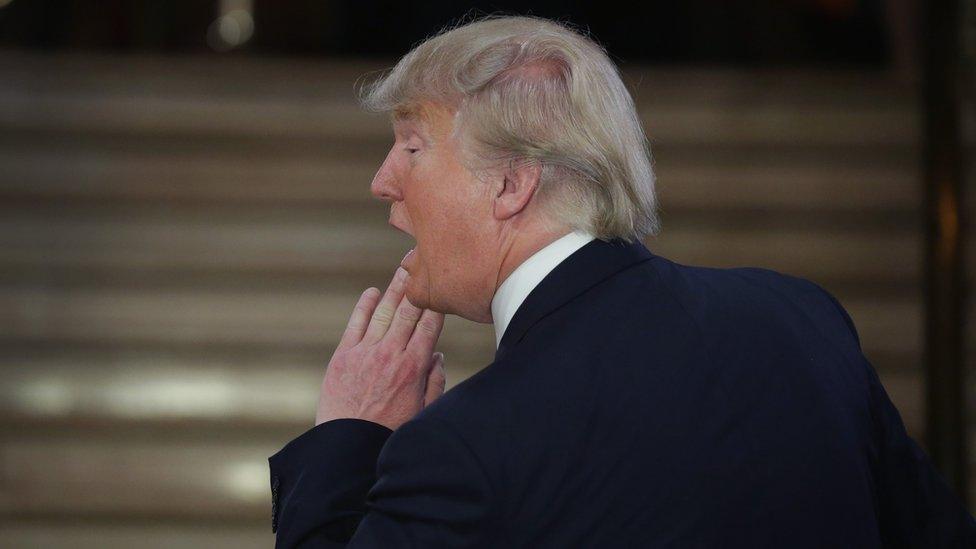
Stray penises have long been a problem for presidential aspirants, but ordinarily candidates try to conceal the evidence rather than boast about the dimensions of their manhood.
Donald Trump's decision to do so in a televised debate last Thursday, in response to childish taunts from Marco Rubio that the size of his stubby fingers was indicative of other bodily endowments, may well come to be regarded as a turning point in the race - the moment when his bawdy, frat boy boastfulness impeded his path to the Republican nomination.
The instant when he became a casualty rather than a beneficiary of the kind of controversy that so far has propelled his campaign.
The results from the weekend provided evidence that Super Tuesday may have marked the point of Peak Trump, and the race could become harder from here. Ted Cruz, in winning Kansas and especially Maine, did unexpectedly well, and cemented his position as the billionaire's strongest rival.
In the overall weekend vote tally, taking in Mr Trump's victories in Louisiana and Kentucky, the Texan received 35.3% compared to Mr Trump's 35.6%. Trailing a long way behind in what increasingly looks like a two-horse race were Rubio on 17.0% and Kasich on 9.5%.
The results from Louisiana may also have been a portent of things to come. Trump had a 20 point lead among those who cast their votes before Saturday, but saw his lead dwindle when voters turned up on primary day. In a state that has long been receptive to populists with racially charged messages that is an unmistakable sign that Trump's antics last week have tarnished his brand.
As Sean Davis, the data-crunching founder of The Federalist, has noted, Trump won 62% of the delegates prior to Super Tuesday, 43% on Super Tuesday but only 30% thereafter. "This race is not even close to over," he wrote.
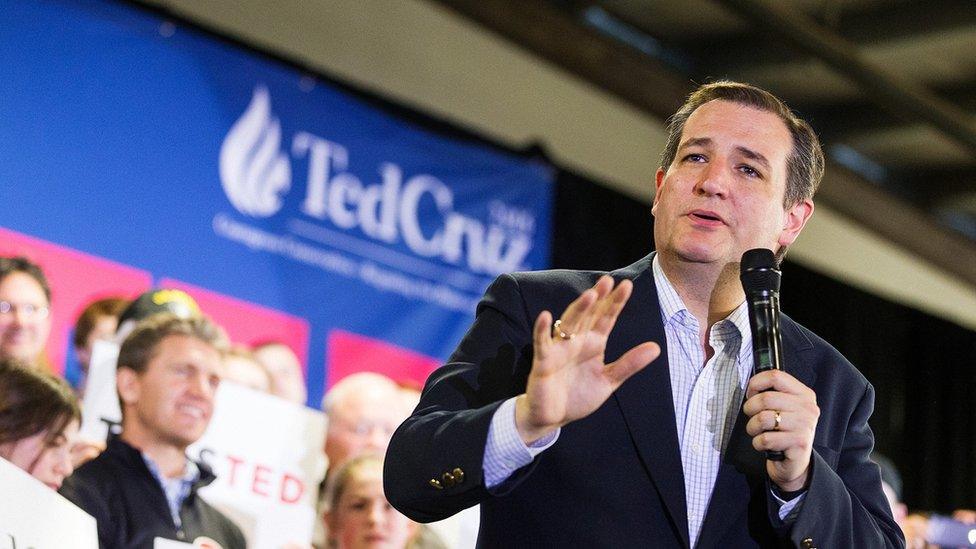
Can Ted Cruz and the remaining candidates pick off enough delegates from Trump to force a brokered convention?
When it comes to the Stop Trump coalition, size matters, and now it has reached the kind of critical mass that makes it a force to be reckoned with. Unsurprisingly, its membership includes opinion leaders on the left, who have always regarded the billionaire not just as a prime vulgarian but a serious threat to the American republic.
In an excoriating editorial entitled American Demagogue, David Remnick, the editor of The New Yorker, has likened him to the "authoritarians and xenophobes who have come to power in Russia, Poland, and Hungary".
Nicholas Kristof, a columnist with the New York Times, labelled him "America's Ahmadinejad."
Donald Trump has broadened his appeal
The progressive academic EJ Dionne harrumphed: "The 2016 Republican primary campaign is now on track to be the crudest, most vulgar and most thoroughly disgusting in our nation's history."
Alarmed by Trump's dominance, late-night comedians no longer view him merely as a figure of fun, a caricature to be mined for laughs. A hard-hitting video produced by Bill Maher likening Trump to Hitler went viral instantly.
So, too, did a Trump takedown authored by the British comedian John Oliver in which he showed once more why he's regarded as Jon Stewart's rightful heir. Then there was an email from the comedian Louis CK sent to his legion of fans.
"Please stop it with voting for Trump. It was funny for a little while. But the guy is Hitler."
He described the property tycoon as an "insane bigot" and wrote "Trump is not your best. He's the worst of all of us. He's a symptom to (sic) a problem that is very real. But don't vote for your own cancer. You're better than that."
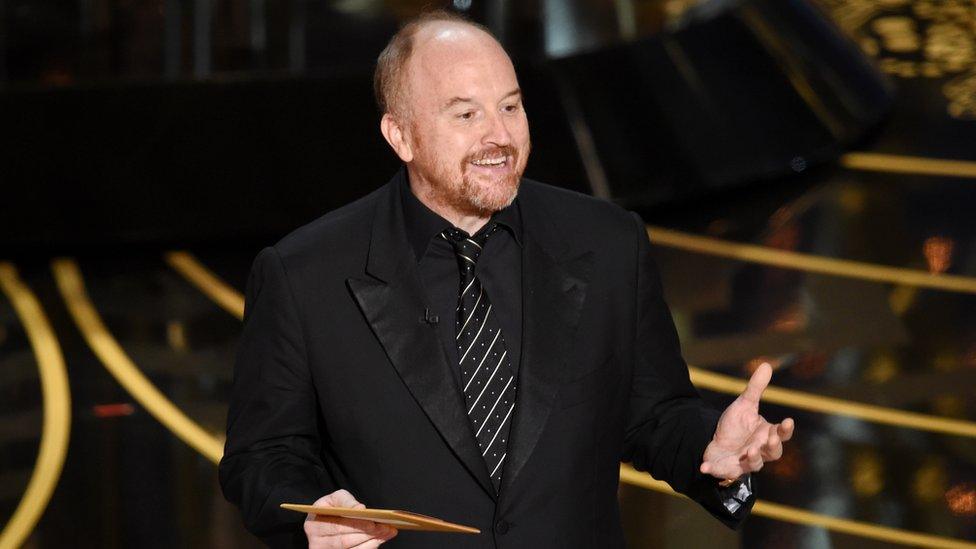
Louis CK likened voting for Trump to "voting for your own cancer"
What made Louis CK's intervention all the more significant was that he intends to vote for a conservative as president.
Emails, monologues, videos, memes, tweets. The zeitgeist-setting kingpins of American pop culture are now bringing their full arsenal to bear against Trump.
And in a country where the boundaries between politics and pop culture have become so blurred, late-night comedians have never been more influential in setting the bounds of decency and acceptability. That said, they're singing to a liberal choir.
Politically more significant has been the pile-on from Republicans not just repulsed by Trump's penis gag but his refusal initially to disavow the support of David Duke, a former Grand Wizard of the Ku Klux Klan.
The Nebraskan Senator Ben Sasse announced he planned to vote for a third party candidate.
The House Speaker Paul Ryan complained on the eve of Super Tuesday, that "if a person wants to be the nominee of the Republican party, there can be no evasion and no games."
Mitt Romney positioned himself as the titular leader of the Stop Trump movement, by following up his Twitter sniping with a howitzer of a speech in Utah in which he labelled the billionaire a "phoney and a fraud."
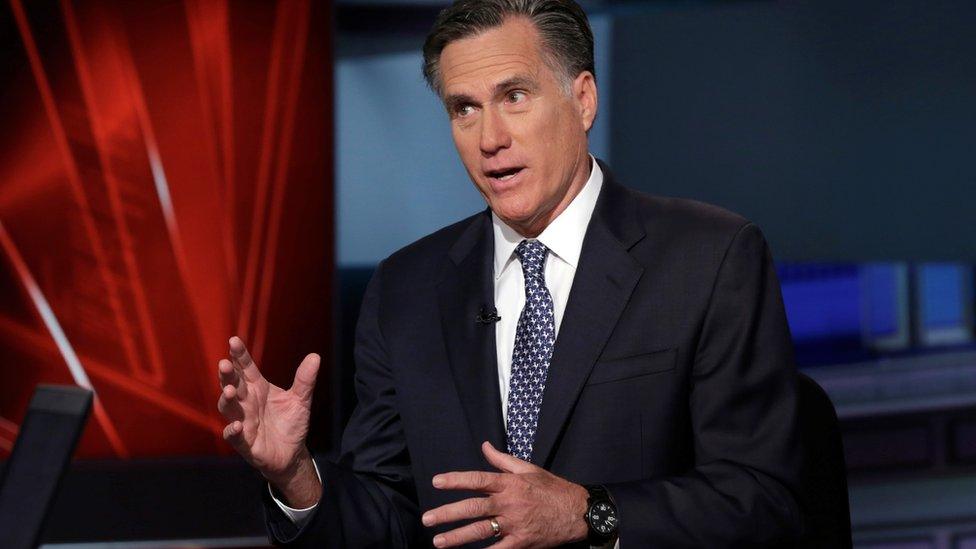
Mitt Romney, the 2012 Republican nominee, has reappeared in the public eye to denounce Trump
Trump inevitably tried to cast Romney as an establishment loser who botched the 2012 election. But the former presidential nominee still racked up almost 61 million votes four years ago and commands respect from mainstream Republicans.
The latest political heavyweight to weigh in is the former New York mayor Michael Bloomberg, who had been considering a third-party run. Trump, he complained in an essay explaining his decision not to fight, has run "the most divisive and demagogic presidential campaign I can remember, preying on people's prejudices and fears. Abraham Lincoln, the father of the Republican Party, appealed to our 'better angels'. Trump appeals to our worst impulses."
Big money is also being lavished on anti-Trump advertisements, $10m in Florida alone, external.
At the same time that the Stop Trump movement has started to speak with more of a clarion voice, prominent members of the pro-Trump movement have literally been rendered speechless.
That fate has befallen Trump's latest bestie Chris Christie, whose hushed appearance alongside the billionaire on the night of Super Tuesday was likened to a hostage video.
Which other prominent establishment figures will now step forward to back Trump when they risk being ridiculed as a stooge and ordered by the billionaire to "go home"?
Trump has been written off before, and it would be mad to do so now. Polls still suggest that he has strong leads in Michigan, which votes on Tuesday, and in Florida, his second home, which votes next week, although the latest survey showed that Rubio is closing the gap.
The Stop Trump movement may already be too late to stop his onward march to the nomination. But it is slowing him down.
The irony is that the main beneficiary is Ted Cruz, a right-wing firebrand also hated by the Republican establishment. Senator Lindsay Graham, who himself ran for the Republican nomination, has compared the choice to "being shot or poisoned".
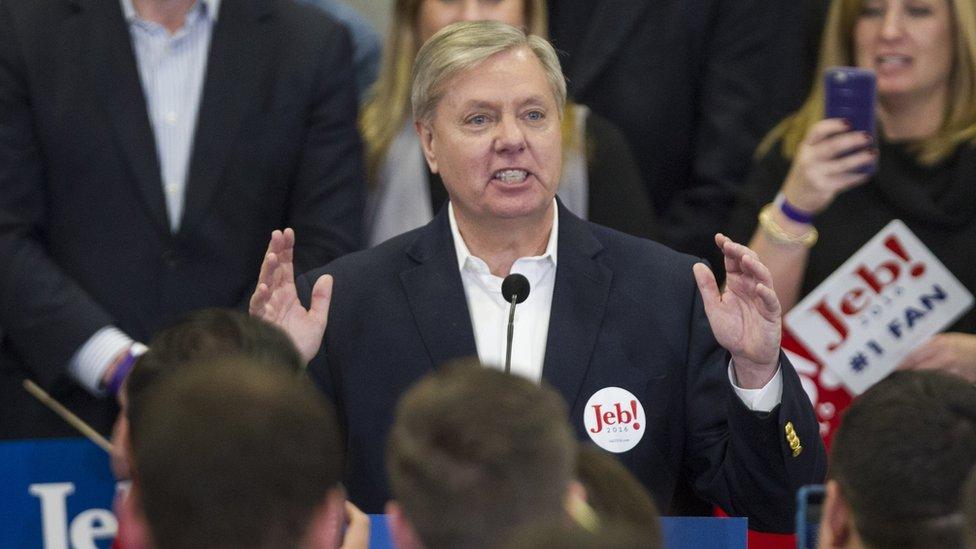
Lindsey Graham dropped out, then his preferred also-ran, Jeb Bush, also left the race
A Trump slowdown also raises the possibility that no single candidate will get the 1,237 delegates required to win the nomination on the first ballot.
That would lead to a brokered convention, the white whale of modern-day American politics, often talked about but seldom seen. But in Republican politics especially, the new normal is that there is no normal.
The simple fact that we are talking about the measure of Trump's challenge rather than the size of his manhood speaks of how the results from the weekend have altered the complexion of the race. Trump remains the strong front-runner, but is not yet the presumptive nominee.